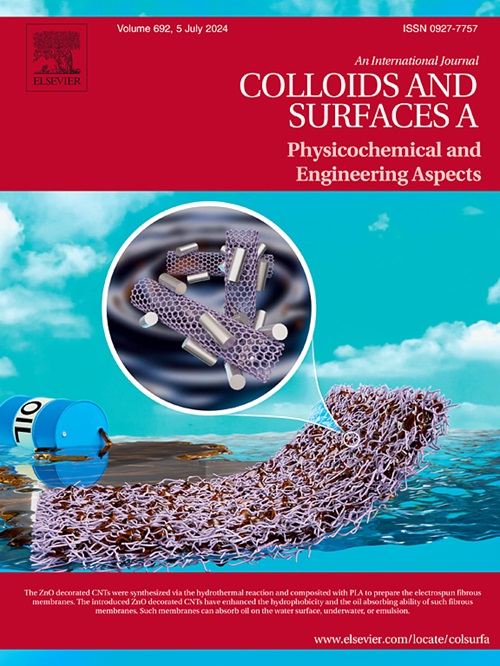Magnetic porous cobalt-embedded nitrogen-doped biochar derived from natural loofah cellulose for efficient adsorption of tetracycline from water
IF 4.9
2区 化学
Q2 CHEMISTRY, PHYSICAL
Colloids and Surfaces A: Physicochemical and Engineering Aspects
Pub Date : 2024-11-18
DOI:10.1016/j.colsurfa.2024.135772
引用次数: 0
Abstract
Carbon-based composite materials with high specific surface areas can provide favorable conditions for wastewater treatment. Nevertheless, it remains challenging to sustainably synthesize high-adsorption performance carbon materials on a large scale. Here, we report a facile green method for the scalable synthesis of magnetic porous adsorbents using inexpensive and widely available natural loofah (L) biomass as the carbon precursor. Polydopamine (P) and zeolitic imidazolate framework-67 (ZIF-67) were introduced into the biochar via an in situ self-assembly approach to enable heteroatom doping and increase the specific surface area. After carbonization under a N2 atmosphere, the nitrogen-doped adsorbent of C-(ZIF-67@P@L) retained a highly interconnected honeycomb-like 3D porous structure with a high specific surface area of 444.59 m2/g. Adsorption kinetics and thermodynamics conformed to the pseudo-second-order kinetic and Langmuir isotherm model, with the maximum adsorption capacity estimated at 662.25 mg/g on the basis of the Langmuir isotherm equation. The adsorption mechanism investigation revealed that the adsorption mechanism mainly included electrostatic interactions, π![]() π interactions, hydrogen bonding, and pore filling. Additionally, the adsorbent had good cycle stability and the ability to be magnetically separated from water, making it highly promising for practical wastewater treatment applications.
π interactions, hydrogen bonding, and pore filling. Additionally, the adsorbent had good cycle stability and the ability to be magnetically separated from water, making it highly promising for practical wastewater treatment applications.
从天然丝瓜纤维素中提取的磁性多孔嵌钴掺氮生物炭用于高效吸附水中的四环素
具有高比表面积的碳基复合材料可为废水处理提供有利条件。然而,大规模、可持续地合成高吸附性能的碳材料仍然具有挑战性。在此,我们报告了一种利用廉价且可广泛获得的天然丝瓜(L)生物质作为碳前体,可规模化合成磁性多孔吸附剂的简便绿色方法。通过原位自组装方法将聚多巴胺(P)和沸石咪唑啉框架-67(ZIF-67)引入生物炭,以实现杂原子掺杂并增加比表面积。在 N2 气氛下碳化后,掺氮的 C-(ZIF-67@P@L) 吸附剂保留了高度互联的蜂窝状三维多孔结构,比表面积高达 444.59 m2/g。吸附动力学和热力学符合假二阶动力学和 Langmuir 等温线模型,根据 Langmuir 等温线方程估算的最大吸附容量为 662.25 mg/g。吸附机理研究表明,吸附机理主要包括静电作用、ππ 作用、氢键作用和孔隙填充。此外,该吸附剂具有良好的循环稳定性和与水磁性分离的能力,因此在实际废水处理应用中大有可为。
本文章由计算机程序翻译,如有差异,请以英文原文为准。
求助全文
约1分钟内获得全文
求助全文
来源期刊
CiteScore
8.70
自引率
9.60%
发文量
2421
审稿时长
56 days
期刊介绍:
Colloids and Surfaces A: Physicochemical and Engineering Aspects is an international journal devoted to the science underlying applications of colloids and interfacial phenomena.
The journal aims at publishing high quality research papers featuring new materials or new insights into the role of colloid and interface science in (for example) food, energy, minerals processing, pharmaceuticals or the environment.

 求助内容:
求助内容: 应助结果提醒方式:
应助结果提醒方式:


